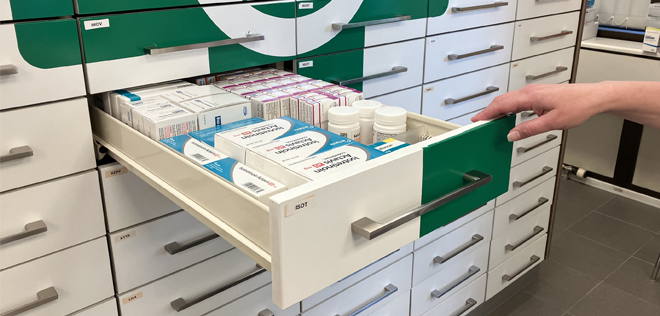Study: Savings in pharmaceutical expenditures are possible by increasing customers’ financial incentives
Customers are more likely to choose a cheaper drug if they have to pay out of pocket for refusing generic substitution. The greater the financial incentives for generic substitution, the larger the savings, according to a new study analyzing generic substitution and reference price policies in Nordic countries.

According Kela, the Social Insurance Institution of Finland, pharmaceutical reimbursements have increased year on year. In 2022, Kela paid out 1.8 billion in these reimbursement expenses. During the past 20 years, pharmaceutical reimbursements by Kela have doubled. According to the Finnish Medicines Agency Fimea generic alternatives can be even 70 to 90 % cheaper than the original drug. However, generic substitution is only possible if the customer agrees to it.
Researchers from the VATT Institute for Economic Research, Aalto University, University of Turku, Helsinki Graduate School of Economics and the Finnish Institute for Health and Welfare investigated how different generic substitution and reference price policies used in Nordic countries affected pharmaceutical expenditures and the availability of pharmaceuticals. They analyze how policy changes affect expenditure per daily dose, drug prices and other market outcomes. The study finds that policies that give consumers incentives to choose cheaper drugs can generate significant savings without affecting the availability of drugs.
"Based on our study, the Finnish reference price system has generated significant savings in pharmaceutical expenditures. However, the current system could be improved by enhancing customer incentives and by otherwise steering their choices towards cheaper alternatives. When revising policies, it is important to ensure that the changes do not decrease the availability of drugs", says senior researcher Markku Siikanen from the VATT Institute for Economic Research.
Financial incentives steer choices towards cheaper alternatives
Since the 1990’s, Finland and other Nordic countries have had policies in place to curb pharmaceutical expenditures by providing consumers incentives to choose cheaper products. In 2003, Finland adopted a generic substitution policy, which enabled pharmacies to substitute prescribed drugs with cheaper interchangeable products, unless the doctor has explicitly forbidden substitution. Based on the study, this policy had little impact on pharmaceutical expenditures.
In 2009, Finland adopted a reference price system, where each drug is assigned a reference price. Consumers are reimbursed on the basis of the reference price irrespective of the product they choose. If the price of the product chosen by the consumer is higher than the reference price, then the consumer must pay the price difference fully out of pocket in addition to the copayment. Following the reform, expenditure per daily dose dropped by 13 percent, without affecting availability.
"Our research shows that financial incentives do matter. In Nordic countries, pharmaceutical expenses are generously reimbursed as a part of the social security system. This can decrease the consumers’ incentives to substitute towards cheaper alternatives, unless the policies in place actively encourage them to do so", says Markku Siikanen.
Improving financial incentives could bring additional savings
The study examines six different consumer choice policies used in Nordic pharmaceutical markets. During the observation period, all the Nordic countries had a policy in place for generic substitution. The ways of steering consumer choices varied from simply providing price information to various financial incentives. The strictness of the policy is defined by the financial incentives in place and how they affect the reimbursement consumer receives if the consumer does not choose a cheaper alternative.
In the reference price system used in Finland since 2009, the consumer must pay the difference between the price of the chosen product and the reference price. Sweden has had a much stricter auction-based system in place since 2009. In this system, only the product which wins the monthly auction is reimbursed, with some exceptions.
The stricter system adopted in Sweden reduced expenditure per daily dose by 29 percent without affecting the availability of pharmaceuticals during the observed time (36 months). A substantial part of the savings can be explained by changes in consumer behavior because the effect of the policy change on wholesale prices was modest in comparison to the impact on expenditure.
"Our research shows that savings in pharmaceutical expenditures are mainly driven by demand reallocation and improving price competition only plays a modest role. For this reason, in evaluating regulation for pharmaceutical markets, the focus should be on cost savings and other market outcomes, not just price changes", says Markku Siikanen.
Evaluating regulation changes in the Nordic pharmaceutical market
The researchers examine policy changes in Finnish, Swedish, Danish, and Norwegian pharmaceutical markets. By comparing identical markets in country implementing a policy change to a country, where no changes are taking place, the researchers establish a quasi-experimental research design which allows them credible evidence on the impact of policy changes on expenditure per daily dose, drug prices and other market outcomes. The study analyses six different policy reforms.
Instead of looking at individual products, the study looks at markets consisting of products containing the same active substance. The number of markets included in the analysis varies from 15 to 112 per studied reform. The studied markets account for 3.5 to 26 percent of the total retail market sales in studied countries’ pharmaceutical markets. The study uses extensive wholesale market data from the Nordic countries.
Keywords
Contacts
Markku SiikanenSenior ResearcherVATT / Julkiset palvelut ja paikallinen julkistalous
Tel:+358 50 463 4572markku.siikanen@vatt.fiDocuments
VATT Institute for Economic Research specializes in applied economic research. We produce high-quality scientific research to evaluate economic policy and support evidence-based policy making. Find out more about our work at https://vatt.fi/en/
Alternative languages
Subscribe to releases from Valtion taloudellinen tutkimuskeskus VATT
Subscribe to all the latest releases from Valtion taloudellinen tutkimuskeskus VATT by registering your e-mail address below. You can unsubscribe at any time.
Latest releases from Valtion taloudellinen tutkimuskeskus VATT
VATT sote-säästöistä: päivystys- ja leikkaustoiminnan keskittämiseen sisältyy myös riskejä28.6.2024 11:37:54 EEST | Tiedote
Hallitus on keskittämässä merkittäviä terveydenhuollon palveluita, kuten päivystys- ja leikkaustoimintaa. Valtion taloudellinen tutkimuskeskus VATT ymmärtää palveluiden keskittämistä, mutta huomauttaa myös riskeistä.
Tutkimus: Ulospäinsuuntautuneisuuden arvostus työmarkkinoilla on kasvanut – menestykseen voi nousta muutoinkin kuin älykkyydellä27.6.2024 15:32:41 EEST | Tiedote
Ulospäinsuuntautuneisuuden arvostus on kasvanut työmarkkinoilla 2000-luvun alusta lähtien. “Tunnollisuus ja korkea koulutus ovat säilyttäneet arvostuksensa, mutta rinnalle on noussut myös ulospäinsuuntautuneisuus, johon kuuluvat sosiaalisuus, aktiivisuus ja energisyys”, kertoo Valtion taloudellisen tutkimuskeskuksen VATT:n erikoistutkija Ramin Izadi tutkimuksesta, joka julkaistaan arvostetussa yhdysvaltalaisessa tiedejournaalissa Journal of Labor Economicsissa.
VATT: Suomi on liittymässä polttoaineiden päästökauppaan kustannustehokkaasti – mutta samalla ei tulisi luoda uusia tukiautomaatteja25.6.2024 12:00:17 EEST | Tiedote
Suomi on vuonna 2027 liittymässä liikenteen ja lämmityksen päästökauppaan. Valtion taloudellinen tutkimuskeskus VATT arvioi, että liittymistä EU:n uuteen päästökauppajärjestelmään ollaan toteuttamassa kustannustehokkaalla tavalla. Tutkimusprofessori Marita Laukkanen kuitenkin kritisoi arvioita päästökaupan vaikutuksista polttoaineiden hintoihin, sekä mahdollisia kompensaatioita yrityksille.
Forskare: Skatterevisioner ökar beskattningsutfallet genom att förändra företagens beteende18.6.2024 07:00:00 EEST | Tiedote
Efter skatterevisioner rapporterar företagen omedelbart högre beskattningsbar inkomst, och de rapporterade inkomsterna ligger även kvar på en högre nivå i minst fem år efter revisionen. En tredjedel av det beskattningsutfall som genereras av skatterevisioner förklaras av de förändringar som revisionerna medför i företagens rapporteringsbeteende.
Eurooppalaisten ja yhdysvaltalaisten julkistaloustieteilijöiden kokoontuminen Helsingissä17.6.2024 10:43:17 EEST | Uutinen
Taloustieteen kutsuvieraskonferenssi kokosiarvovaltaisen joukon taloustieteen tutkijoita Helsinkiin 12.–14. kesäkuuta 2024. Tilaisuuden aiheina olivat vero- ja tulonsiirtojärjestelmät.
In our pressroom you can read all our latest releases, find our press contacts, images, documents and other relevant information about us.
Visit our pressroom